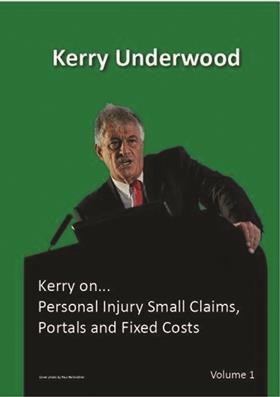Kerry… on Personal Injury Small Claims, Portals and Fixed Costs
Kerry Underwood
£80, Law Abroad Publishers
It is the mark of a good legal textbook that it should be well-thumbed. We were sent Kerry Underwood’s latest offering a few months ago, and I am pleased to report that it is already looking dog-eared.
The book comes in three volumes, which is something of a challenge, but Underwood is clearly concerned with providing a comprehensive route map through the personal injury maze.

The book has a glittering cast of contributors and plenty of plaudits from leaders in the field. It also
has a free subscription service, which enables the reader to get updates as well as access to statutes, statutory instruments, the CPR and case reports.
At the beginning of volume 1, Underwood makes an interesting prediction. He believes that firms doing a general mix of civil litigation, including personal injury, will benefit from the government’s courts bill, whereas ‘factory firms’ will lose out. That bill, which introduces a tariff for soft tissue injuries, has not yet been implemented but it lurks ready to become law. Qualified one-way costs shifting is not covered because, as Underwood explains, he has written a book on that subject.
I found the layout of the book a little difficult to follow at first. Each part of each volume has a number of chapters. Part I has four chapters, one of which is a page-and-a-half long. The book admits in its introduction that ‘like Topsy this book growed’ and it does rather plunge into the maze.
Part 5 of the bill is reproduced at the end of part 1 chapter 4, but it is not clear that this is a section of the bill itself.
As I read through the volumes, I found the language very different from that used by other legal commentators (including myself). It
has a somewhat breathless quality but I never found it difficult to understand.
The book also struck me as highly technical. One can attempt to produce a ‘Noddy’ guide to complex procedural laws but that approach does not work and is dangerous from a risk point of view.
The sheer detail of these volumes is highly impressive, and the real value of this book is its ability to provide answers to what are some very difficult and obscure questions. For instance, what happens when a solicitor deliberately undervalues a claim in order to pay a lower fee? I found that I could dip into this book and find the answer that I needed relatively easily.
My view is that every law firm that undertakes this type of work should have a copy of Underwood’s book.
Malcolm Johnson is a senior associate in the personal injury department of BL Claims in London






























